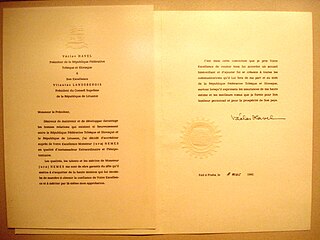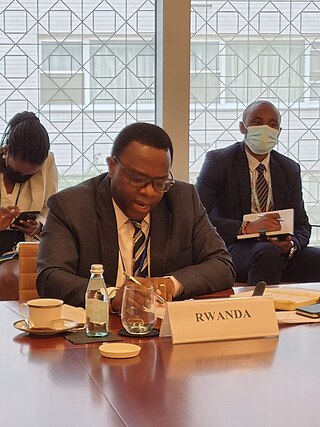
Uganda has formal diplomatic relations with many countries,some accredited. Since the colonial era and after independence Uganda has grown to be one of the most important African countries. Uganda has diplomatic relations with many countries throughout Africa,the Americas,Asia,Europe and Oceania. Uganda is a member of the United Nations and the Commonwealth of Nations since 1962.

Kurt Furgler was a Swiss politician and member of the Swiss Federal Council (1972–1986).

A letter of credence is a formal diplomatic letter that designates a diplomat as ambassador to another sovereign state. Commonly known as diplomatic credentials,the letter is addressed from one head of state to another,asking them to give credence to the ambassador's claim of speaking for their country. The letter is presented personally by the ambassador-designate to the receiving head of state in a formal ceremony,marking the beginning of the ambassadorship.
Ronald Ian "Ron" Spiers was an American diplomat who served as an Ambassador to several countries during the 1970s and 1980s.

John Gunther Dean was an American diplomat. From 1974 to 1988,he served as the United States ambassador to five nations under four American presidents. He is also notable for surviving an assassination attempt likely perpetrated by Israel.

Zoran Jolevski is a Macedonian diplomat and the former Minister of Defense of the Republic of Macedonia. Prior to his appointment as Minister of Defense,he served as Macedonia's Ambassador to the United States of America. In November 2008,he was appointed chief negotiator to the Macedonia naming dispute,and in 2011 he was appointed Ambassador to the United Mexican States and as Permanent Representative to the Organization of American States. He served as Secretary General of the late Macedonian president Boris Trajkovski from 2000–2004. He holds a Ph.D. in International Economy from Ss. Cyril and Methodius University of Skopje. He is married to Suzana Jolevska,and together they have two sons,Pero (1988) and Filip (1992).

John Hubert Kelly was an American diplomat.
Robert E. Lamb was Assistant Secretary of State for Administration within the U.S. State Department from 1983 to 1985. He also served as an Assistant Secretary of State for Diplomatic Security from 1987 to 1989 and the United States Ambassador to Cyprus from 1990 to 1993.

Anthony Cecil Eden Quainton was an American diplomat who served as the United States ambassador to the Central African Empire,Nicaragua,Kuwait,and Peru.

Dimiter Tzantchev is a European diplomat,Ambassador,Head of European Union delegation to the State of Israel. He joined the European external action service after a long and distinguished career in the Bulgarian diplomatic service. He was Bulgaria's Ambassador to the EU,the UN in Geneva and to Israel. Tzantchev was President of COREPER II - January 1 - June 30,2018 during the first ever Bulgarian rotational presidency of the Council of the EU. One of the longest serving Permanent Representatives to EU in Brussels he was also the Dean of COREPER II from August 2017 until September 2021.
The presidency of Ronald Reagan began on January 20,1981,when Ronald Reagan was inaugurated as the 40th president of the United States,and ended on January 20,1989.

Tudor Ulianovschi is a Moldovan politician and diplomat who was Foreign Minister of Moldova between January 2018 and June 2019. Prior to that,he served as the Moldovan Ambassador to Liechtenstein and Switzerland.
Relations between East Germany and the United States formally began in 1974 until the former's collapse in 1990. The relationship between the two nations was among the most hostile during the Cold War as both sides were mutually suspicious of each other. Both sides conducted routine espionage against each other and conducted prisoner exchanges for their respective citizens which included spies for both the Americans and Soviets.
Rolf Sieber was a German politician,diplomat,and rector who served as the first Ambassador of East Germany to the United States from 1974 to 1978. He was the rector of Berlin School of Economics and Law from 1979 to 1988. Prior to his appointment and while serving as ambassador,he was a member of the Volkskammer from 1963 to 1976.
Horst Grunert was a German diplomat who served as the second Ambassador of East Germany to the United States from 1978 to 1983 and as ambassador to Austria from 1983 to 1986.

Guillaume Kavaruganda is a Rwandan career diplomat who has spent the majority of his career serving in a number of diplomatic capacities.











